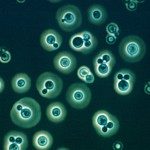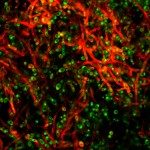Lien vers Pubmed [PMID] – 15590833
Eukaryotic Cell 2004 Dec;3(6):1601-8
We report the identification and disruption of the Cryptococcus neoformans var. grubii UGD1 gene encoding the UDP-glucose dehydrogenase, which catalyzes the conversion of UDP-glucose into UDP-glucuronic acid. Deletion of UGD1 led to modifications in the cell wall, as revealed by changes in the sensitivity of ugd1Delta cells to sodium dodecyl sulfate, NaCl, and sorbitol. Moreover, two of the yeast’s major virulence factors-capsule biosynthesis and the ability to grow at 37 degrees C-were impaired in ugd1Delta strains. These results suggest that the UDP-dehydrogenase represents the major, and maybe only, biosynthetic pathway for UDP-glucuronic acid in C. neoformans. Consequently, deletion of UGD1 blocked not only the synthesis of UDP-glucuronic acid but also that of UDP-xylose. To differentiate the phenotype(s) associated with the UDP-glucuronic acid defect alone from those linked to the UDP-xylose defect, ugd1Delta mutants were phenotypically compared to strains from which the gene encoding UDP-xylose synthase (i.e., that required for synthesis of UDP-xylose) had been deleted. Finally, studies of strains from which one of the four CAP genes (CAP10, CAP59, CAP60, or CAP64) had been deleted revealed common cell wall phenotypes associated with the acapsular state.

